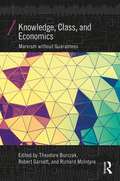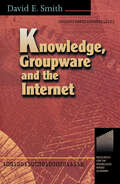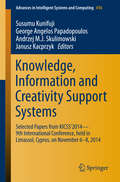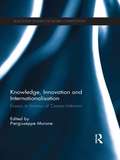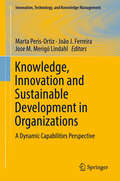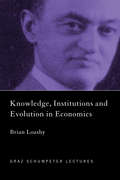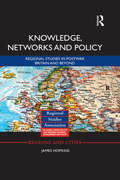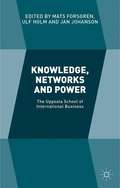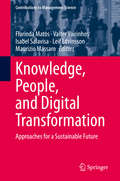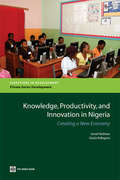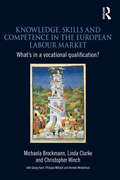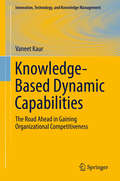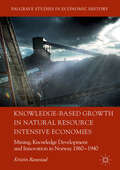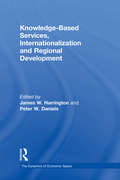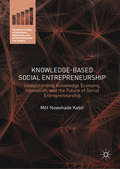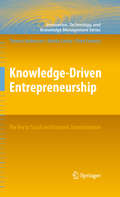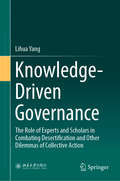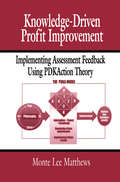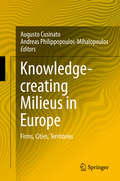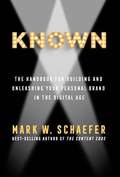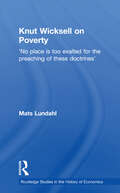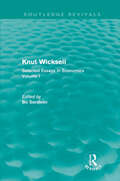- Table View
- List View
Knowledge, Class, and Economics: Marxism without Guarantees (Economics as Social Theory)
by Theodore A. Burczak Robert F. Garnett Jr. Richard McIntyreKnowledge, Class, and Economics: Marxism without Guarantees surveys the "Amherst School" of non-determinist Marxist political economy, 40 years on: its core concepts, intellectual origins, diverse pathways, and enduring tensions. The volume’s 30 original essays reflect the range of perspectives and projects that comprise the Amherst School—the interdisciplinary community of scholars that has enriched and extended, while never ceasing to interrogate and recast, the anti-economistic Marxism first formulated in the mid-1970s by Stephen Resnick, Richard Wolff, and their economics Ph.D. students at the University of Massachusetts-Amherst. The title captures the defining ideas of the Amherst School: an open-system framework that presupposes the complexity and contingency of social-historical events and the parallel "overdetermination" of the relationship between subjects and objects of inquiry, along with a novel conception of class as a process of performing, appropriating, and distributing surplus labor. In a collection of 30 original essays, chapters confront readers with the core concepts of overdetermination and class in the context of economic theory, postcolonial theory, cultural studies, continental philosophy, economic geography, economic anthropology, psychoanalysis, and literary theory/studies. Though Resnick and Wolff’s writings serve as a focal point for this collection, their works are ultimately decentered—contested, historicized, reformulated. The topics explored will be of interest to proponents and critics of the post-structuralist/postmodern turn in Marxian theory and to students of economics as social theory across the disciplines (economics, geography, postcolonial studies, cultural studies, anthropology, sociology, political theory, philosophy, and literary studies, among others).
Knowledge, Groupware and the Internet
by David SmithKnowledge, Groupware, and the Internet details the convergence of modern knowledge management theory and emerging computer technologies, and discusses how they collectively enable business change and enhance an organization's ability to create and share knowledge. This compendium of authoritative articles explains the relationship between knowledge management and two major technologies enabling it: Groupware and the Internet. These critical technologies help an organization evolve from individual to group knowledge, quickly make tacit knowledge explicit, and enable people to use and apply this knowledge. Knowledge, Groupware and the Internet helps readers understand how to unite the people and technologies that define effective knowledge management.
Knowledge, Information and Creativity Support Systems
by George Angelos Papadopoulos Janusz Kacprzyk Susumu Kunifuji Andrzej M. J. SkulimowskiThisvolume consists of a number of selected papers thatwere presented at the 9th International Conference on Knowledge, Informationand Creativity Support Systems (KICSS 2014) in Limassol, Cyprus, after theywere substantially revised and extended. The 26 regularpapers and 19 short papers included in this proceedings cover all aspects ofknowledge management, knowledge engineering, intelligent information systems,and creativity in an information technology context, including computationalcreativity and its cognitive and collaborative aspects.
Knowledge, Innovation and Internationalisation: Essays in Honour of Cesare Imbriani (Routledge Studies in Global Competition #63)
by Piergiuseppe MoroneAs firms increasingly rely on knowledge as a key factor for innovation, the ability to innovate is increasingly perceived as a key asset for being competitive in international markets. This new volume argues that innovation, knowledge and internationalisation should be viewed as tightly related concepts. It provides a stimulating and comprehensive framework for understanding key tendencies in modern economics, as well as an overview of the state of the art in the three fields covered. The first section explores in detail the relationship between knowledge and the innovative capability of firms, focussing on key topics such as social capital, intentional knowledge diffusion and unintentional knowledge spillovers. Section two examines the drivers and the impact of innovation strategies, assessing the role of technological advantage, networking and R & D investments in innovation, as well as the impact on innovation on the labour market. The third and final section examines the ongoing internationalisation process faced by ‘global’ economies. The topics explored in each section are tightly linked, ensuring that a strong thematic thread runs through the collection.
Knowledge, Innovation and Sustainable Development in Organizations: A Dynamic Capabilities Perspective (Innovation, Technology, and Knowledge Management)
by Marta Peris-Ortiz João J. Ferreira Jose M. Merigó LindahlThis volume explores the ways in which knowledge and innovation impact business and economic sustainability, offering a wide-ranging and richly illustrated study of knowledge, innovation and sustainability of organizations from a dynamic capabilities perspective. In organizational theory, dynamic capability is defined as an organization’s ability to react and adapt adequately and rapidly to external change. In today’s global economy, pursuing sustainable strategies and practices is critical to organizational success. Complying with externally and internally imposed sustainability targets might initially appear as a restriction for organizations; however, they can be transformed into a new set of opportunities. This means that the classic ways in which management absorbs the experiences associated with evolving conditions, organizational frameworks and markets must be reconsidered in light of the preservation of the technological, environmental and social ecosystems. Featuring research and case studies from sectors such as NGOs, SMEs, education and agriculture, this book offers students, academics, practitioners and policymakers a multi-faceted understanding of how and why knowledge, innovation and sustainability are intricately linked—and offers insight into best practices that balance organizational and societal needs.
Knowledge, Institutions and Evolution in Economics (The Graz Schumpeter Lectures)
by Brian LoasbyWinner of the Schumpeter Prize, 2000 and Winner of the Smith Prize in Austrian Economics, 2000, this book explores how the limitations of human knowledge create both opportunities and problems in the modern economy. The growing field of evolutionary economics has developed as a result of the traditional failure of the discipline to explain certain phenomena that impact greatly on the economy. These are:*Evolution - the impact on the economy of natural change over time*Institutions - the impact on the economy of government and/or company policy, rules and regulations*Knowledge - the impact on the economy that is felt when new information becomes availableKnowledge, Institutions and Evolution in Economics is a punchy overview of these topics and one that has become regarded as something of a modern classic that no serious social sciences academic or student should be without.
Knowledge, Networks and Policy: Regional Studies in Postwar Britain and Beyond (Regions and Cities)
by James Hopkins‘The region’ has been used to understand and propose solutions to phenomena and problems outside the dominant spatial scale of the twentieth century – the nation state. Its influence can be seen in multiple social science disciplines and in public policy across the globe. But how was this knowledge organised and how were its concepts transmuted into public policy? This book charts the development of the academic field of Regional Studies and the application of its concepts in public policy through its learned society, the Regional Studies Association. In their modern form, learned societies often play a complementary role to universities, offering networks that operate in the spaces between and beyond universities, connecting specialised academics and knowledge and making it possible for them to have impact outside the academy. In contrast to the geographically tangible and popularly understood role of the university, contemporary learned societies are nebulous networks that transcend barriers and whose contribution is difficult to discern. However, the production and dissemination of knowledge would be stunted were it not for the learned society connecting scholars through a network of publications and events. This book traces the intellectual history of regional studies and regional science from the 1960s into the 2000s and the impact of the regional concept in public policy through the changing priorities of government in the UK and Europe. By approaching the history through the Regional Studies Association, it interrogates the role and function of the ‘learned society’ model of organisation in contemporary academia and importance as a knowledge exchange vehicle for public policy influence.
Knowledge, Networks and Power
by Mats Forsgren Ulf Holm Jan JohansonThis book presents more than four decades of research in international business at the Department of Business Studies, Uppsala University. Gradually, this research has been recognized as 'The Uppsala School'. The work in Uppsala over the years reflects a broad palette of issues and approaches. There are, though, some common characteristics of most of the contributions which motivates the 'school' label, beyond the fact that all have their origin in Uppsala. We claim that the dominating workhas been devoted to three basic themes; knowledge as an asset and as a problem, markets as business networks and power within and between organizations. In this book these three themes have been discussed relation to firms' internationalization process and the multinational firm as an organization. A dominating feature of the work done in Uppsala is also its strong emphasis on empirical data as a base for theory development, which often has been collected through personal interviews with Swedish firms.
Knowledge, People, and Digital Transformation: Approaches for a Sustainable Future (Contributions to Management Science)
by Leif Edvinsson Florinda Matos Valter Vairinhos Maurizio Massaro Isabel SalavisaThe impacts of the digital transformation on society in general, and particularly on people’s lives, are the subject of increasing debate among policymakers, researchers and industry. This book explores the challenges of this new revolution, identifies solutions, and demonstrates how knowledge management can enable the transition process associated with the digital transformation, guided by the principles of sustainability. Featuring contributions by experts from diverse areas of science and business – on topics ranging from the digital transformation of knowledge management in the public sector, to the creation of sustainable smart cities, regions and countries, and from using AI for business models to food security – it provides a comprehensive discourse on the digital transformation’s impacts on employment, education, governance, social life, sustainability, values, the economy and democracy.
Knowledge, Productivity, and Innovation in Nigeria: Creating a New Economy
by Giulia Pellegrini Ismail RadwanNigeria has a bold national vision of becoming one of the world's top 20 economies by 2020. However, despite being the 8th most populous country in the world, it ranks 41st in terms of GDP and 161st in terms of GDP per capita. Nigeria has long depended on oil for its exports and government revenues. This dependence has led to rent seeking and a reluctance to examine potential avenues for economic diversification. The authors of 'Knowledge, Productivity, and Innovation in Nigeria' believe that the goal of becoming a top-twenty economy can only be achieved if Nigeria makes the transition to a new economy rooted in the 21st century that harnesses the power of knowledge and avoids a static oil-based growth strategy. Knowledge has always been central to development, but new technologies have made it globally accessible. Countries such as the Republic of South Korea, India, and the United States that have exploited new technologies and know-how have pushed their innovation and productivity frontiers. Countries that have failed to do so risk remaining mired in poverty. In order to achieve Vision 2020, Nigeria must move beyond the stop-start patterns of oil-based development that have characterized it since independence. It must create a stable and prosperous economy based on a critical mass of knowledge workers. Knowledge, Productivity, and Innovation in Nigeria examines how Nigeria can prepare for this century and where its leaders can focus to achieve their vision, presenting the experiences of other countries from which Nigeria can learn.
Knowledge, Scale and Transactions in the Theory of the Firm
by Mario MorroniFirms in market economies vary enormously in size, nature and competitiveness. In this important contribution to the literature on the theory of the firm, Mario Morroni provides a fresh analytical framework which improves our understanding of the causes of this diversity in organisational design and performance. The relations between internal and external basic conditions, decision-making mechanisms and organisational co-ordination are addressed, as are the circumstances in which capabilities, transactions and scale-scope considerations interact. With the emergence of the knowledge-based economy and the increasing pressure of global competition, the development of capabilities is acquiring ever greater importance in boosting competitiveness. Morroni shows that long-term relational agreements enhance learning processes and offer powerful tools for improving competitiveness in a context of conflicting interests, incomplete knowledge and uncertainty.
Knowledge, Service, Tourism & Hospitality: Proceedings of the Annual International Conference on Management and Technology in Knowledge, Service, Tourism & Hospitality 2015 (SERVE 2015), Bandung, Indonesia, 1-2 August 2015
by Ford Lumban Gaol Zuwati Hasim Fonny Hutagalung Abd Razak ZakariaThis proceedings volume contains papers presented at the 2015 International Conference on Management and Technology in Knowledge, Service, Tourism & Hospitality (SERVE 2015), covering a wide range of topics in the fields of knowledge and service management, web intelligence, tourism and hospitality. This overview of current state of affair
Knowledge, Skills and Competence in the European Labour Market: What’s in a Vocational Qualification?
by Christopher Winch Linda Clarke Michaela BrockmannFor the free movement of labour across the European Union, establishing transparency and comparability of qualifications across member states is vital. This book examines how qualifications, knowledge, skills and competences are understood in different national contexts and trans-nationally and reveals a complex picture of differences and similarities both within and between countries. Against the background of EU policy initiatives, and in particular the European Qualifications Framework, an important focus is on the prospects and difficulties of establishing cross-national recognition of qualifications. Drawing on case studies of particular sectors and occupations in England, France, Germany and the Netherlands, this insightful book, written by leading academics in the field, will be a vital resource for students and researchers involved with vocational education and training, continuing professional development, human resource management and European Union policy.
Knowledge-Based Dynamic Capabilities: The Road Ahead in Gaining Organizational Competitiveness (Innovation, Technology, and Knowledge Management)
by Vaneet KaurThis book provides a knowledge-based view to the dynamic capabilities in an organization. The author integrates two existing views on gaining competitive advantage: the Knowledge View which suggests that the capability of organizations to learn faster than competitors is the only source of competitiveness; and the Dynamic Capability View which speculates that a firm’s competitive advantage rests on dynamic capabilities which enable a firm to constantly renew the stock of ordinary organizational capabilities in accordance with the changes in the business environment. Using the IT sector in India as a case study, this book provides and tests a new framework--Knowledge-Based Dynamic Capabilities—in the prediction of competitive advantage in organizations.
Knowledge-Based Growth in Natural Resource Intensive Economies: Mining, Knowledge Development and Innovation in Norway 1860–1940 (Palgrave Studies in Economic History)
by Kristin RanestadThis book rejects the idea that natural resource industries are doomed to slow growth. Rather, it examines the case of Norway to demonstrate that such industries can prove highly innovative and dynamic.Here, the case is compellingly made that a key empirical problem with the popular ‘resource curse’ argument is that some of the richest countries in the world – namely Norway, Sweden, Canada and Australia – have all developed fast-growing economies based on natural resources. Analysis of innovation and knowledge development in natural resource industries reveal important new insights about the role of learning and innovation. These insights are key to understanding variances in growth levels between natural resource-based economies. Ranestad illustrates how Norway’s high economic performance is built on knowledge-based natural resource industries. While Norwegian industries may have originated because of foreign technology and expertise, they thrived due to further developments carried out by organisations within Norway. Ranestad looks at how these developments were possible due to the country’s high level of human capital, capacity for knowledge absorption and ability to adapt to new global technological and economic circumstances.
Knowledge-Based Services, Internationalization and Regional Development (The Dynamics of Economic Space)
by Peter DanielsThe acquisition and management of information is central to the operation and marketing of many service-providing firms and other organizations. Their varied knowledge requirements influence approaches to organizational structure, relationships to other organizations, the location of operations, and entry into new markets. In this book, an international and interdisciplinary team of leading scholars examines the attributes of knowledge acquisition and diffusion within and across service-providing organizations. Using a variety of case examples, they pay particular attention to the processes of internationalization and the ways in which service-providing organizations affect regional economic development.
Knowledge-Based Social Entrepreneurship: Understanding Knowledge Economy, Innovation, and the Future of Social Entrepreneurship (Palgrave Studies in Democracy, Innovation, and Entrepreneurship for Growth)
by Mitt Nowshade KabirSocial entrepreneurship is on the rise and social enterprises are solving some of the most critical and enduring social problems by using innovative, pragmatic and sustainable business models. Access to knowledge thanks to the Internet and rapid expansion of the knowledge economy are opening new opportunities for social ventures. With knowledge-based social entrepreneurship where knowledge is the primary resource, more pressing social problems can be addressed by using advanced technologies. This book investigates this emerging concept, possibilities that it holds, its place in today’s economy, and links bridges between knowledge, innovation, and social entrepreneurship. Academics, entrepreneurs, students, and NGOs will find the theoretical and practical information presented in this book extremely valuable.
Knowledge-Driven Entrepreneurship
by Piero Formica Martin G. Curley Thomas AnderssonThe current economic era, characterized by the rapid and global dissemination of information and capital, has been called the "knowledge age," the "entrepreneurial society," and the "intangibles economy," among other labels. Technological and productivity improvements continue to shift the emphasis from the mastery of physical assets (e.g., natural resources, factories) and physical tools (e.g., machines) to that of intangible assets (e.g., education, R&D projects, brands, patents) and socio-cultural tools (e.g., communities of knowledge practice) as the key to a community's economic prosperity. The purpose of this book is to build a bridge between knowledge and entrepreneurship, which have traditionally been separated by the walls of academic disciplines. Building on the pioneering work of Peter Drucker and William Baumol, the authors explore the intricate relationships among knowledge generation, innovation, new business creation, and the institutions that support them. Demonstrating direct links between the flow and application of knowledge, innovations in products and processes, the development of new enterprises, and generation of economic wealth, the authors strongly argue that these assets must be protected and sustained through national and regional institutions that encourage creativity and experimentation. Employing illustrative examples from around the world, the authors focus on the crucial role of societies to educate and support entrepreneurs and establish the right environment for new business development and rapid conversion of ideas into enterprises that contribute to economic growth and prosperity.
Knowledge-Driven Governance: The Role of Experts and Scholars in Combating Desertification and Other Dilemmas of Collective Action
by Lihua YangThis book explores a new model for addressing the central issue of environmental and other collective actions. An alternative to the classical models: central authority, privatization, and self-governance, it has provisionally been named “expert and scholar-based-” or “knowledge-driven governance”. The book also identifies seven working rules (or design principles) for successful knowledge-driven governance, and argues that the more strictly these rules are abided by, the more successful this model of governance becomes. Lastly, it demonstrates that in addition to Lindblom’s observed intellectually guided society and preference-guided/volition-guided society, there may be the possibility of a knowledge-driven society in which knowledge or intellect plays a greater role. The results obtained are supplemented by numerical calculations, presented as tables and figures. This book is intended for graduate students, lecturers and researchers working in environmental management, environmental science and engineering, sustainable development, collective action, and public administration.
Knowledge-Driven Profit Improvement: Implementing Assessment Feedback Using PDKAction Theory
by Monte Lee MatthewsThis book presents an innovative and radically logical way of thinking about organizational knowledge and competition that centers on discipline, integration and focus. By tapping into the previously unrealized strengths that lie in all companies, the author suggests that it is possible for companies to move beyond informational chaos to create focused and enticing new opportunities. The 12 step method presented in the first five chapters show you how to take information from feedback from assessments, surveys and audits, convert it into usable knowledge and get bottom line improvements. The strategy expands the plan-do-check-act (PDCA) model into a Plan-Do-Knowledge-Act (PDKA) process. The case studies provided reinforce the principles and the theory behind them. Significant challenges face any organization intent on becoming world-class by managing knowledge effectively. They can be classified into four types: making use of your information by integrating it, organizing the different forms of information into a manageable framework, focusing equal attention on your strengths and your weaknesses, developing decision-making criteria based on key company drivers. The12 steps outlined in Knowledge-Driven Profit Improvement: Implementing Assessment Feedback Using PDKAction Theory will show you how to make your company into a world-class organization. Features Assists companies in becoming more competitive Serves as a guide for companies to use when taking their feedback from assessments, surveys, and audits, then integrating the feedback, and prioritizing it so that financial and operational improvements can be made Allows companies to use the information they have been accruing for years Helps companies establish better business priorities for the purpose of better planning Demonstrates the significance of improvements made by using the information gained from assessments.
Knowledge-creating Milieus in Europe
by Augusto Cusinato Andreas Philippopoulos-MihalopoulosThis book introduces a radically spatialised approach to knowledge creation and innovation. Reflecting on an array of European urban and regional developments, it offers an updated notion of milieu as the conceptual and material space of knowledge and innovation in line with the interpretative turn in social sciences and humanities. In view of the unwillingness of mainstream economics to accommodate such a trend, the authors pursue a broadly understood hermeneutic approach that expands on the triad of knowledge-space-innovation. The book's main findings are that space is an essential intermediary in the connection between knowledge and innovation, and that a renewed notion of milieu provides the knowledge-space-innovation triad with both an analytical basis and operational power. It also offers fresh insights into the significance and potential of the knowledge economy. A number of empirical European case studies on various scales (organisations, cities and territories) support the findings and suggest new policy directions.
Known: The Handbook for Building and Unleashing Your Personal Brand in the Digital Age
by Mark W. SchaeferIn today's world, there is a permanent advantage to becoming known in your field. Those who are known get the customers, the better jobs, and the invitations to exclusive opportunities. But can anybody become known? In this path-finding book, author Mark Schaefer provides a step-by-step plan followed by the most successful people in diverse careers like banking, education, real estate, construction, fashion, and more. With amazing case studies, dozens of exercises, and inspiring stories, KNOWN is the first book its kind, providing a path to personal business success in the digital age.
Knut Wicksell on the Causes of Poverty and its Remedy (Routledge Studies in the History of Economics #Vol. 73)
by Mats LundahlKnut Wicksell is arguably the greatest Swedish social scientist of all time, and poverty was a theme that occupied him all his life. Indeed, it was probably Wicksell's interest in poverty that was the critical factor in drawing him away from his purely mathematical background towards a greater understanding of the social sciences as a whole. In this outstanding volume, Mats Lundahl, one of the world's leading development economists, examines Wicksell's thinking in the area of poverty, and shows the importance of his contributions to this field.
Knut Wicksell: Selected Essays in Economics, Volume 1 (Routledge Revivals: Knut Wicksell)
by Bo SandelinKnut Wicksell made enormous contributions to capital theory, monetary theory and fiscal policy. However whilst his books are widely available in English, few of his more than 800 articles have ever been translated. This volume, first published in 1997, includes new translations of Wicksell's contributions to marginalism and capital theory; public economics and unemployment.
Knut Wicksell: Selected Essays in Economics, Volume 2 (Routledge Revivals: Knut Wicksell)
by Bo SandelinThis book, along with its predecessor, makes most of Wicksell's most important contributions accessible to English speaking readers for the first time. The essays collected here, first published in 1999, focus on money and price theory and include Wicksell's book reviews of Leon Walrus, Ludwig von Mises and John Bates Clark.
